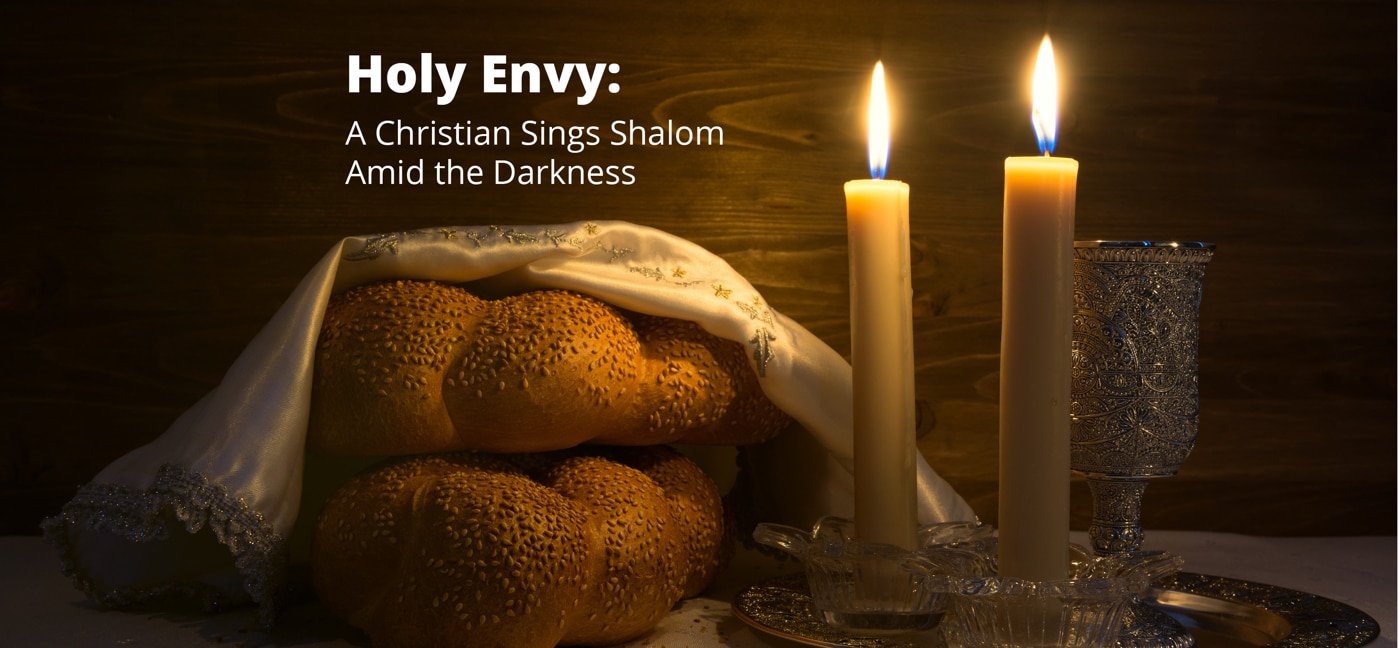Holy Envy: A Christian Sings Shalom Amid the Darkness

I remember my first Shabbat dinner. The smell of challah baking in the oven transports me back to that “oh holy night” in an instant.
It was a cold night in Krakow, Poland and I shivered against the air in a small room off one of the city’s main squares, waiting for the cantor in front of me to signal we were ready to begin.
I had just spent the day at the Auschwitz-Birkenau Memorial, stumbling alongside a Holocaust survivor who described in great detail the horrors he had experienced because of his faith, because of his identity.
We had walked through the rows and rows of bricks, the models of barracks, and rooms full of shoes belonging to those who would never again walk on this side of heaven. Each step seemed to fill the group with uneasy silence and pushed us closer to hopelessness, closer to a horror that seemed impossible to shake.
We emerged from the day with cold in our bones and the sense of an evil too palpable to bear, one not defeated by a mere prayer muttered by the countless who lined the train tracks around the former concentration camp’s perimeter.
Shabbat, shalom and the practice of rest and renewal — a religious practice rooted in peace — was the last thing on our minds as we left Auschwitz-Birkenau that day. And yet there we were, mere hours later, seated around long tables at sundown, sitting in silent, rapt attention to the prayer we had been promised would come.
Suddenly the silence was broken and the still strong voice of the Holocaust survivor, himself a cantor since boyhood, filled the room. He lifted the kiddush cup, “Vay’chulu hashamayim v’haaretz v’chol tz’vaam” (translation: “Now the whole universe — sky, earth, and all their array — was completed.”) The candles were lit: “Baruch atah, Adonai, Eloheinu, melech haolam, asher kid’shanu b’mitzvotav, v’tzivanu l’hadlik ner shel Shabbat.” (translation: “Blessed are you, Adonai our God, Sovereign of the universe, who hallows us with mitzvot, commanding us to kindle the light of Shabbat.”)
Tears and questions filled the space, silence was replaced with prayer. If the man in front of us who had witnessed the horror of evil and death could answer the ancient call of faith to take hold of rest and peace, so too could we.
“Shabbat Shalom,” we greeted one another. These words, this blessing, put to song began to dance throughout the room, building a sense of anticipation. Slowly, a sense of peace and belonging re-entered the space. The challah broken, the prayers sung, the candles lit. God still with us, peace still possible and shalom still present.
I have since experienced Shabbat dinner several times since that holy evening. While I come from the Christian tradition and a denomination that does not undertake the tradition of Shabbat dinner or Havdalah, I returned from that evening, determined to restore the gift of Shabbat to my own spiritual practice. I remember reading the words of Rabbi Sacks who reminded people of faith today that “Shabbat is where a restless people rested and renewed itself.”
In that moment, I was reminded that I too am told as a Christian to rest. I too am called to live the invitation of true Sabbath shalom. I too am told by Exodus 2-:8-10 that the “seventh day is a Sabbath day of rest dedicated to the Lord your God.” I too am reminded in Hebrews 4:9-11 that “here is a special rest still waiting for the people of God.” I am reminded that since the beginning of time, we are a people who are constantly called back to a place of rest; we are commanded to be a people defined by peace regardless of how dark and hopeless the world appears to be.
Each week I now make a practice of marking the Sabbath in my own way. So if you arrive at my front door on a Friday night, do not be surprised if you smell freshly baked challah right out of the oven. I will look at you and we will both remember this story of when I first witnessed light piercing through the dark. And I will invite you to remember that no matter how dark the world gets, God is still with us, peace is still present, and Shabbat and shalom are still possible.
Hannah Marazzi is a writer and marketer based out of Ottawa Ontario. She is passionate about community, dialogue, and empowering the next generation of young people to belong to their communities. Hannah has worked in the human rights, multi-faith, and communication sectors and was raised in a Mennonite Community in British Columbia. She is believes that faith is an integral part of the public sphere and continues to seek out conversations regarding the intersection of faith in common and public life.
Editor’s note: This essay is part of an ongoing series on Holy Envy. People of various religions explain what they admire in other faiths. The purpose is to increase understanding and solidarity between believers.
![]()



